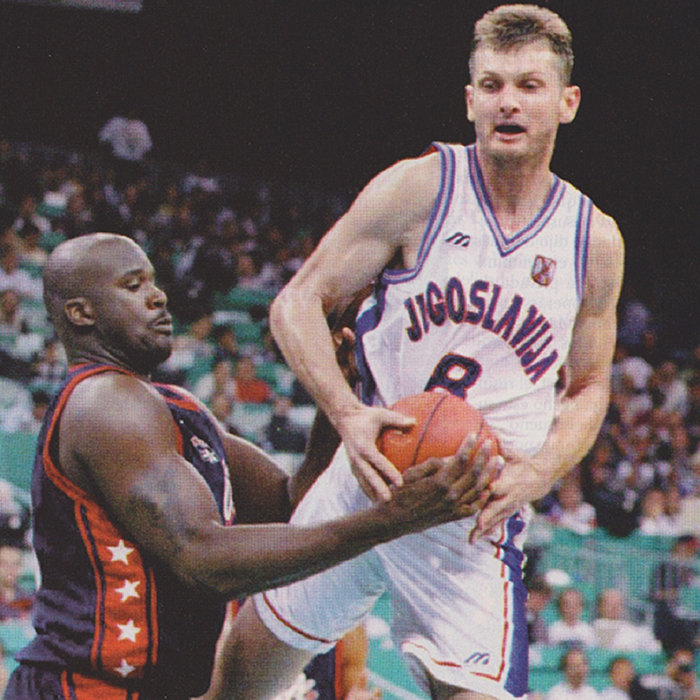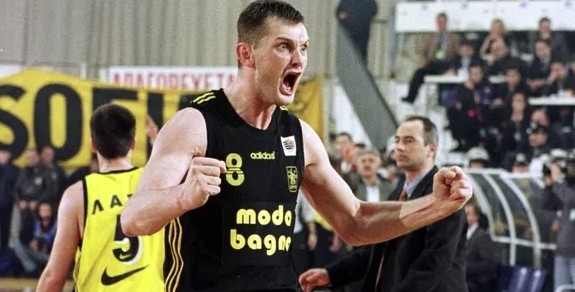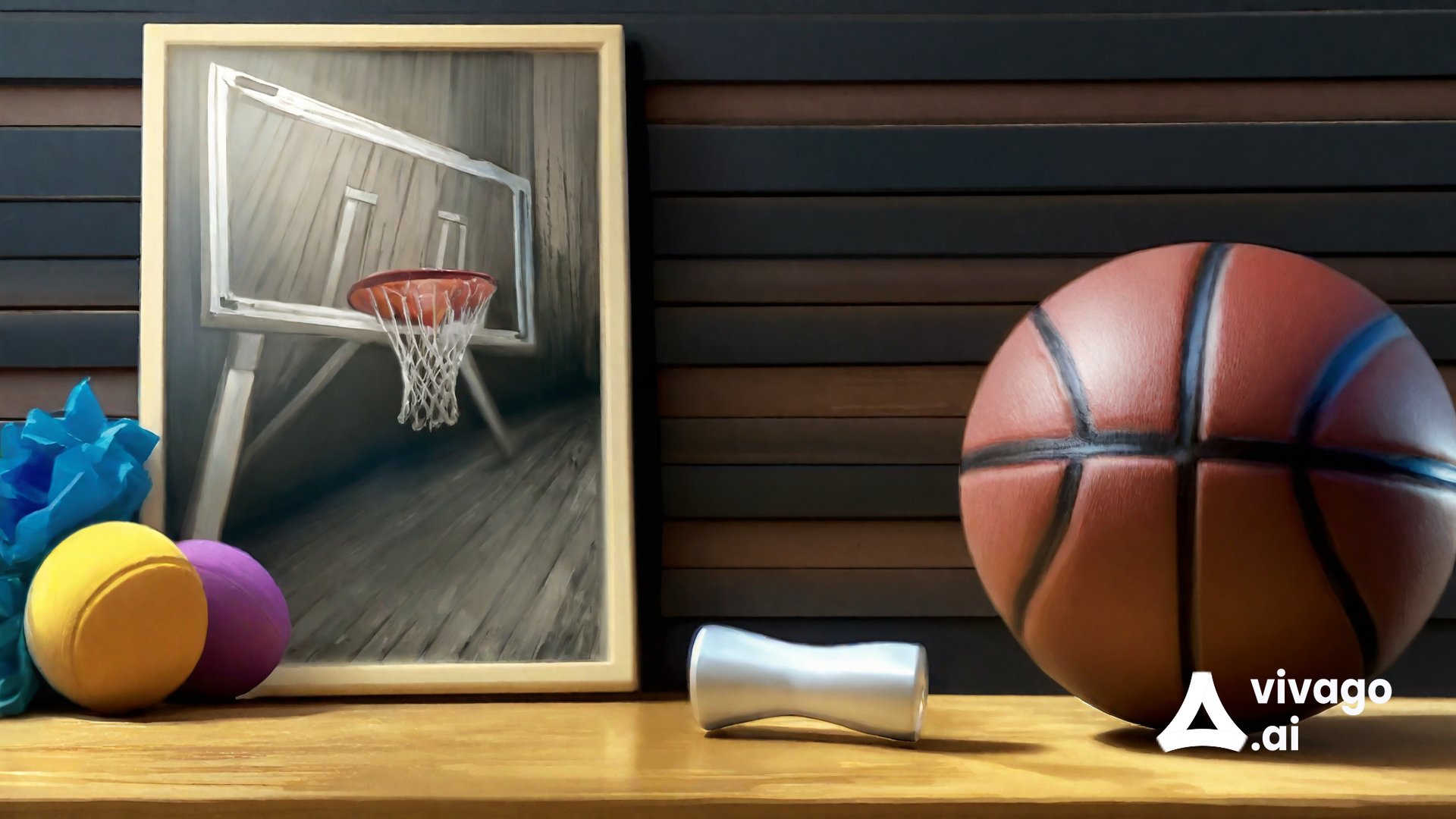
Zarko Paspalj
"An ode to joy"
RETROPLAYERS
Antreas Tsemperlidis
4/1/202514 min read
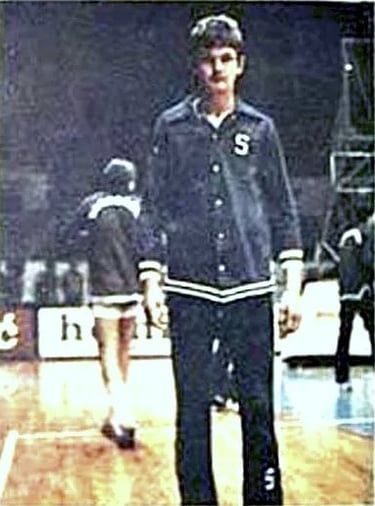

If someone asks me the one and only memory, I have from the 1990s Olympiacos basketball team, the answer will be immediate. A tall blond with floppy ears and the number 8 on his slightly hunched back, almost always coming out of surprise from the right side of the court, stepping hard and dunking with both hands. Great players wore the red and white jersey during those years of dominance by the Piraeus team in 90s Greek basketball. But the one who sowed the seeds and reaped the fruits of success, the one on whom the team's rebirth was based, the pioneer of the top, was the left-handed forward from Montenegro named Zarko Paspalj(e).
In the mountains of Pljevlja, where he was born March 27th of 1966, there were not many professional options for his parents, Jovan and Mileva, and so the couple moved to the capital, Titograd (now named Podgorica) when the little boy was two years old. Zarko was growing, getting taller and seemed he would surpass the two-meters mark. Playing basketball was the only way to achieve that and so at the age of 10 he found himself in the "school" of Buducnost, a team that at that time was a big reservoir from which the greats of Yugoslav basketball drew players. His youth coaches tried to instil in him a more "orthodox" shooting form than the obviously particular one he posessed. Only one these coaches in the end let this slide, seeing that the little guy was a true diamond - Zarko's father’s fellow countryman, Bogdan Tanjević. He would let him develop without trying to tweak his shooting mechanics.
At 16, he made his debut in the first division alongside Budućnost stars Knežević, Milatović and the Bojanić brothers, as a 2.06m tall kid with the number 5 on his blue jersey. Slowly but steadily, Zarko becomes the first option of the team and is called to the National Team Youth Team ranks. He proceeds to win the European Championship in 1983 and in '85 at just 19, he is the leader of Budućnost that surprises everyone, finishing in third place in the domestic championship. With Duško Ivanović as the key scorer leading the charge and a 20-year-old with his ears sticking out, sprinting across the court like a deer in the wilds and spearheading the fast break, the Montenegrins defeated everyone at "Morača" - except for Cibona - and with an additional three more away wins, totalling 13 victories, they secured the best finish in their history.
The periphery of Montenegro was too narrow for him and the "greyhounds" of Partizan that had already singled him out will move immediately. The transfer will take place in the summer of 1986 in a cinematic way after he was almost "kidnapped" by the team's leaders so that the move to Bosna Sarajevo, which had the first say, would not take place. In the "Crno Beli" of Belgrade, Paspali will have the opportunity to play with some great players such as Divac, Grbovic and Savovic. He will immediately earn a place in the starting five and at the end of the season he will be rewarded with the champion's medal. His path will meet again with that of Galis in the Champions Cup group, the destination of which was no other than the Final Four in Ghent. Disappointed by their defeat in the semifinals, they will play in the consolation game and Partizan will win third place. Domestically, the rising power, Jugoplastika, will steal the championship title from them despite the efforts of Zarko, who was their top player in the finals series. As a prominent member of the national team, he will travel to Seoul for the Olympic Games, where the renewed Yugoslavia of Ivkovic will fall prey to the whims of Sabonis, resulting in Plavi rising to second place on the podium. The championship scenario will be repeated the following year, Zarko will emerge as the second scorer of the regular season behind Komazec, but in a dramatic finals series, the "babies of Split" will manage to retain their throne. There is no time for celebration, however, as in less than two months, club opponents will be members of the best European national team of all time....
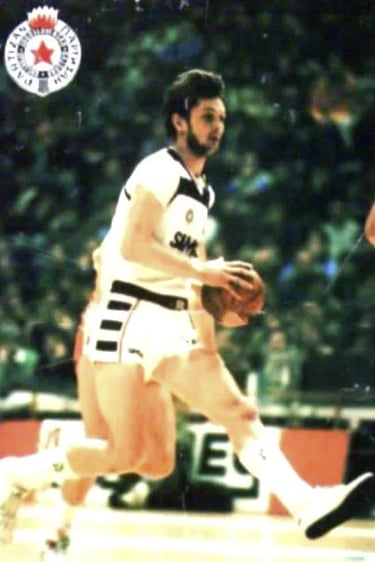

Paspali, Kukoc, Drazen, Divac and the rest of Duda's boys will enchant their compatriots and will convincingly wear the gold medal around their necks. Zarko will play very well and will attract the interest of the San Antonio Spurs, who, while not selecting him in the draft, will offer him a guaranteed two-year contract following the recommendation of assistant coach Gregg Popovich. "Palia" will go to America with complete ignorance about the team and the NBA in general. His lines about Pizza Hut and the legendary "dialogue" with the disciplinarian Larry Brown have been written many times and there is no need to repeat them. I will only focus on one confession.
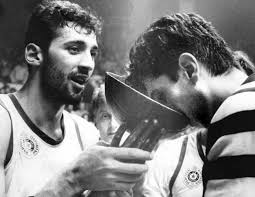

Popovich's, which perhaps partially justifies Zarco's forgettable stint in San Antonio, had notably said: "Even if Paspalli had a 1.5-meter jump or was the best shooter in the world, he wouldn't have played. Sean Elliott had to play". I believe the truth lies somewhere in the middle, since Brown did indeed prefer rookie Elliott to Zarco, but also on his side, with his bad off the court habits -Marlboro packs alert- and his general behaviour, made the coach’s decision not to use him easier. His teammates, however, recognized his talent and had fun with him (Terry Cummings even made a song about him in the style of the popular Zorro series). His release from the team’s roster shortly before the 1990 playoffs was expected and did not cause any surprise. I believe that Paspali was not particularly upset either. He was 24 years old and all he wanted was to play basketball.
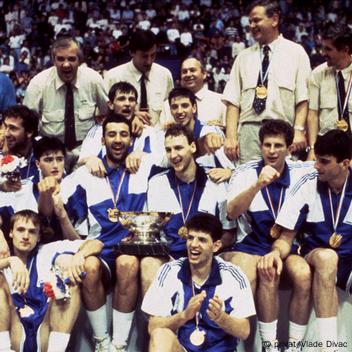

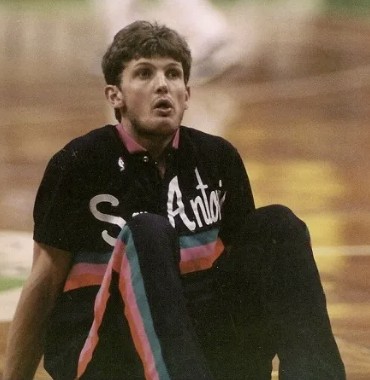

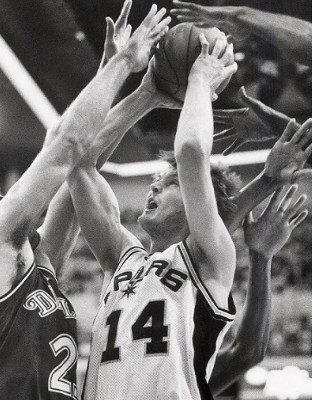

Fortunately for him, Ivkovic does not pay attention to his removal from the Spurs team and will willingly include him in the Yugoslav delegation for the Basketball World Cup in Argentina. Zarko enjoys the coach's trust and will ensure not to expose him. He would be the team's third scorer, second rebounder, a key factor in winning the gold medal. For his return to Europe, several teams will be interested in acquiring him, but he will prefer the certainty of Partizan, considering signing a one-year contract. In this last season in his home team, he will be the leader of the new generation and will lead them to the finals again, but the wall that has been renamed PDO 84 will be raised for the last time. Another last dance -although no one knows it yet – would also be the presence of Yugoslavia in the EuroBasket of Rome as a unified country; the swan song of the once legendary Plavi with another gold medal.
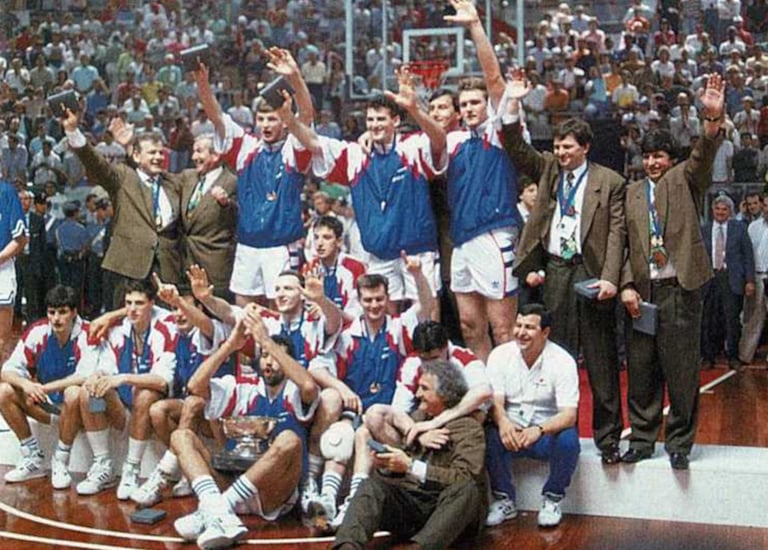

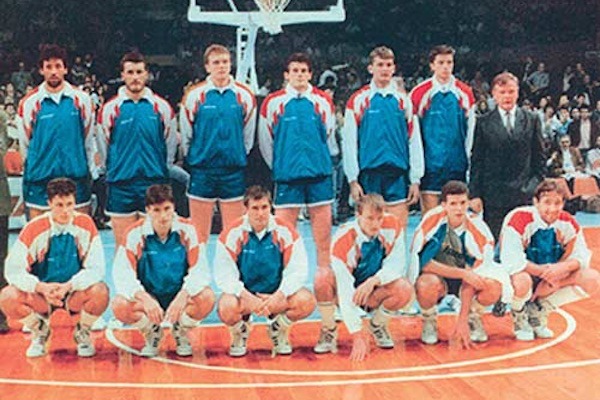

Coach Giannis Ioannidis, who has just agreed to take over Olympiacos will also be in Italy. The main target for the position of the only foreigner allowed in Greek first category (A1) at the time will be Atlanta's point guard, Rod Strickland. But when the NBAer is slow to respond, “Xanthos” (as Ioannidis was nicknamed) will turn to Zarko, who had singled him out during Aris' duels with Partizan. The deal will be sealed on the sidelines of the Eurobasket and after its climax, Paspali will make his way to the old airport of Hellinikon, even if initially Greece was not his first choice as he himself preferred Spain where he believed the basketball style suited him better. The reception that the Red and Whites' fans gave him was worthy of a "Messiah". And as if ready for a long time, Zarko will take prominent fan’s Attilio's trumpet in his hands and sound the charge of a new era for Olympiacos.
At this point, a small parenthesis is necessary to mention the major events taking place for the red and white that summer of 1991. There were three checkmate moves made by new president Sokratis Kokkalis that pulled the Piraeus club out of the mud. The departure of Ioannidis from Aris and his signing with the Pireus team, the arrival of Paspali and the most importantly the decision to move venues from Papastrateio to SEF stadium. The latter involved a particularly great risk since no one knew if the people would embrace the team and if the stadium stands would be consistently full.
Xanthos begins building of the new Olympiacos with the simplest recipe. Tough defence from five "kamikazes" on the floor and in the attack the ball is in the hands of the guy with number 8. What Zarco did in the 1991-92 season was a rare sight and had only been done in previous years by Galis and Ingram. Every match will be an unrepeatable one man show. He scores in every possible and unlikely way. Three-pointers, back-to-back plays, surprise moves, the lot. He will carry the Piraeus team on his shoulders all year and the result will be the most powerful vindication for him and those who trusted him. Top scorer with an average of a staggering 33 points, launching the Red and Whites to second place from eighth place the previous season and returning to the Champions Cup after almost fifteen years. The Montenegrin is worshipped like a god by the fans and the 1992-93 season is the one of Olympiacos' return to the domestic throne and the beginning of a dynasty. The path was anything but paved with roses and the Red and Whites were considered the fourth favourite for the title behind PAOK, Panathinaikos of Galis and the renewed Aris of Roy Tarpley. Ioannidis will belatedly bring in "Truth" Walter Berry to the team as the second foreigner (number of foreign players was increased by then) after the dismissal of Rod Higgins and will trust two kids, Tomic and Tarlac, in the starting five. Olympiacos will start with a shock defeat at Dafni despite Zarko's 54 points!!! and everyone can see that things will not be easy. The situation remains the same in Europe. The team is struggling quite a bit in the group, finishing marginally in third place and will face Limoges in the quarterfinals with home court advantage. In A1, Zarko continues to score like crazy but his performance is only enough for the 4th place of the regular season - if he wants the championship he will have to overcome successive obstacles with Aris being the first. However, before the Greek playoffs, the French team is awaiting the reds for the prize of qualifying to the Final Four of the SEF. The infamous third match and the line that Paspali stepped on (if he ever did) before Zdovc's winning basket still live in all our minds and memories. However, we can't forget his amazing performance in the first match of Patras -with the three-point victory- but also his terrible performance in the second game of Beaublanc. Eventually history says that Olympiacos lost a magnificent opportunity to claim the Champions Cup essentially at home. Ioannidis wpuld try to pick up the pieces of his team and focus on the championship. He will return to the tested formula of giving the keys to Zarko.
Aris team that has been turned upside down by Tarpley's blunder, cannot stop him and the next challenge will be the champions, PAOK. The Red and Whites, taking advantage of a still shocked from the Final Four heartbreak PAOK, will eliminate the champions and will head to the finals with their eternal rivals Panathinaikos. In the second match they will manage to do the “break” and steal the home court advantage. The 3rd game will be remembered for the extravagant TV commercials and Olympiakos’ players warm up drills, all due to the Greens’ choice not to continue the game in protest of the refereeing. Leading the way for the Piraeus team in this series? Who other than the "Roebuck of Montenegro". Like Moses, he had led his team to the Promised Land after a long wandering of 15 years.
After the championship goal was finally achieved, the top of Europe is next in Olympiakos’ sights. Kokkalis spares no expense and will bring Tarpley and Fasoulas to the team, giving Xanthos the opportunity to build a truly formidable team. The Reds have the best front line in Europe and everyone considers them the big favourite to win the Champions Cup. Everything seems ideal for Olympiacos. But suddenly, at some point, Zarko's famous problem with shots and long-range shooting in general appears. The man who had an average of 85% in his career, who in a match against Aris has scored 23/23, for no particular reason begins to see the basket beyond 3 meters as a buttonhole. Much has been heard, nothing has been confirmed. Hand surgery, incurable tendonitis, a microbe that was rotting his hand internally, a problem with his fingers and much more (In a recent interview, Zarco spoke about a small stroke he had suffered). My opinion is that it was purely psychological. Whatever the issue was Paspali had started missing shots. And while this didn't bother him so much since Olympiacos was going full-throttle and playing great basketball for the majority of the season, the same was not the case in the Tel Aviv drama.
The 6.16" that Olympiacos was left without a point, the three-pointer by Cornelius Thompson are well-known facts and do not need to be recorded. But when in the dying moments of the game Zarko stood at the line, no one believed that he would make the free throws. Of course, that's not why he missed them either. But there was little time for grief and tears.
Piraeus was returning to the Greek championship finals and Paspali would leave his stamp in the last match against PAOK, retaining the title for Olympiacos. His last appearance with the red and white team will be the Cup final with Iraklis and a magical basket in front of the 2.18-meter-tall Donaldson. Zarko celebrates the titles without even suspecting what will follow.
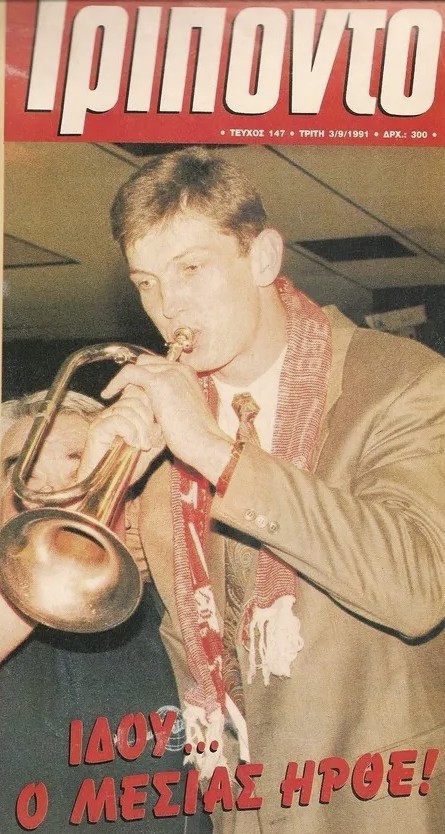

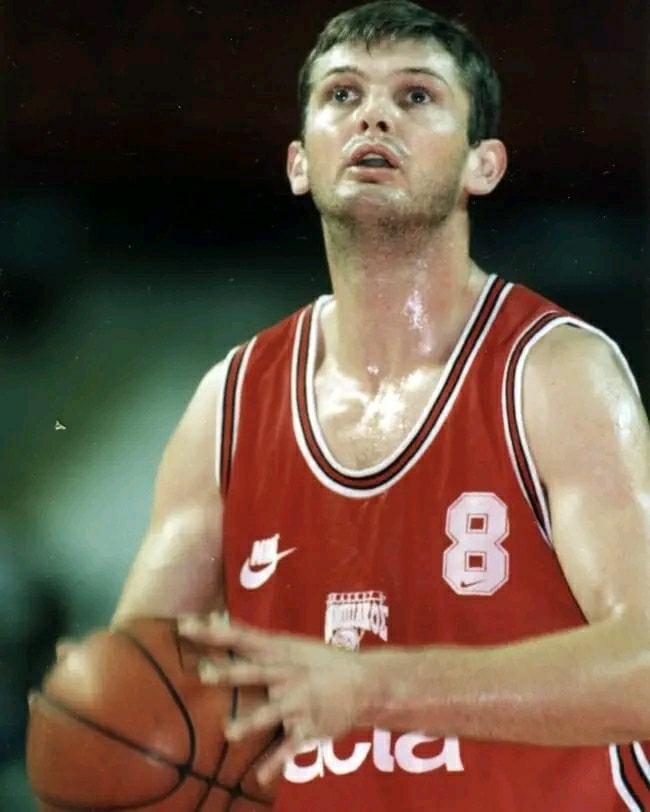

While no one at Olympiacos - at least openly - blames him for the loss in the F4, a decision was taken jointly between Kokkalis and Ioannidis. His contract will not be renewed and on July 1st 1994 Paspali will enter the European market as free agent. Panathinaikos will move immediately, eliminate the doubts of the Montenegrin, who wants to prove that he is not finished and Zarko will sign for the Trifilli. Fate made it so that his first official match with the green jersey will be against Olympiacos. On September 25, 1994 in the "cage" of Sporting, the two teams will abuse the sport. In one of the worst games we have ever seen, the Greens will win with a children’s game scoringwise (42:40) and will qualify for the next phase of the Cup. Paspali, clearly influenced by the abusive slogans of those who once idolized him, will wander around the as if he were lost, in perhaps the worst game of his career.
During the year he will find his role in the team and especially after Galis' departure he will become the leader, giving resounding answers. The one that will make the biggest impression is the winning basket with his right(!) hand in the second-round game against Olympiacos at SEF and the answer he gave when asked why he shot with his left hand: "Because I was holding my balls with my left and I was showing them to Ioannidis" was Zarko's excuse. This ballsy basket will not be combined with a well-aimed free thow, costing Panathinaikos the point difference and the home advantage in the finals. His old love will hurt him in the semi-final of the Zaragoza F4 and in the championship, giving the Olympiacos fans the impetus for one of the most clever slogans ever heard on the Greek courts, reminding Paspali that “he would never win a cyp again”. In the end, Zarko did win a cup that year and even more importantly when, after three years of unfair exclusion, Serbia will reappear at the EuroBasket in Athens, climbing back to the top of the podium, Paspali in a sarcastic moment of self-mockery would sing the infamous slogan while hugging the trophy.


With his national team coach, Ivkovic they will meet again in September in Nea Smyrni and in his new career chapter in Greece. As the leader of the youthful Panionios team, Zarko will often remind us of his unstoppable version while he was playing for Olympiacos. He will gradually regain his long-range shot, largely restoring his “relationship” with shot-making. In the “Square”, he played the most carefree basketball as the courts attsted....
Freed from the stress of hunting the championship, he will go to Atlanta for the 1996 Olympic Games. With his performances there - especially in the first half of the final against USA- he will convince the Hawks to give him a second chance to move to the best league in the world. Indeed, Zarko will try out in the summer league and while the "Hawks" seem to want him, an unforeseen event will force him to return to Greece and put a definitive end to his attempt for the NBA. A girl who worked as a flight attendant accuses him of being the father of her newborn child, demanding what the law foresees (recognition, alimony, etc.). Paspali will be forced to return to refute the accusations. In the end, nothing was proven, but the bitterness remained.
Wanting to calm down from the voracious Greek media and despite the offers he had, he will choose France. Racing Paris, which has been away from titles for 43 years, will find in him the man who will get them a championship again. Zarco's destiny, however, is in his beloved Greece, with his last stop being Thessaloniki and Aris. The year begins with big dreams for the "Emperor" but along the way, financial problems will break the players’ morale who will begin to abandon ship. The heart and pride of those who remained wrote history. In the Final Four of the Cup at Alexandrio, Christos Magotsios' unpaid basketball players will beat a Panathinaikos team worth millions of dollars, leaving the Greens out of the final. Zarco will suffer a serious sprain though and his participation in the final is doubtful, but as another El Cid he will muster all he had left (could hardly put on a shoe) and by almost dragging his foot on the court, will score 12 vital points in the victory over Ioannidis' AEK, in what ended up being his last game with a Greek team jersey.
Due to his injured ankle, he did not manage to play in another competitive game and injury problems were the main reason for his release the following year from the led by his friend Sasha Danilovic, Virtus Bologna. In December 1998, at the age of 32, he announced his retirement from the game.
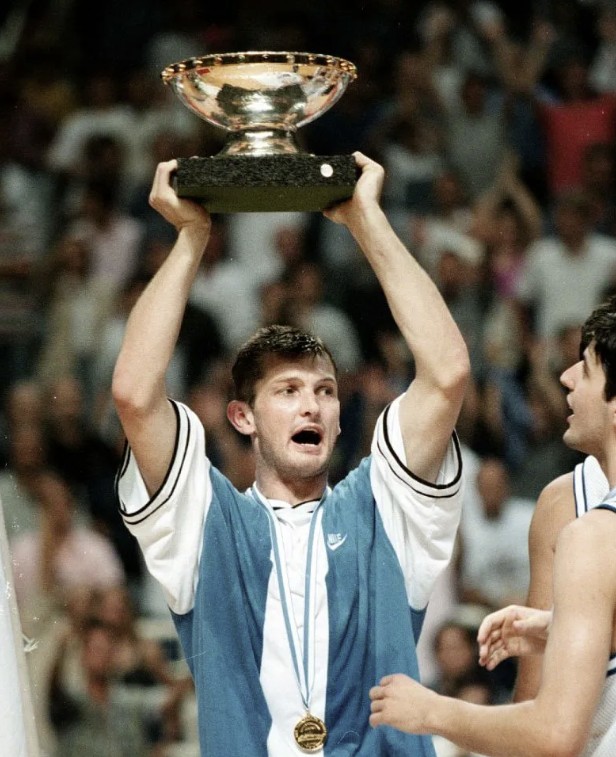

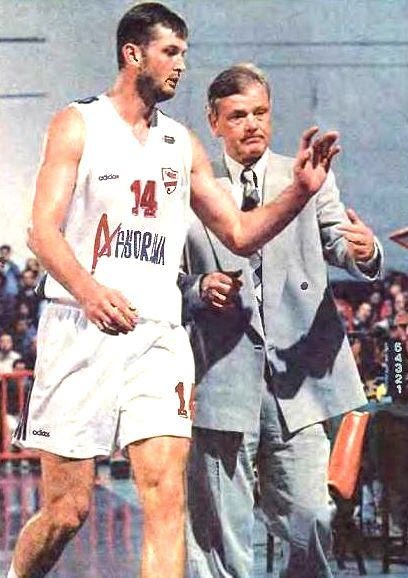

Our memories of him are those he provided as we first met him...
Lightning-fast as an arrow on the court, scoring however he wanted, whenever he wanted. The player who changed the modern basketball history of Olympiacos, the man who awakened a sleeping giant, was passionately loved and fiercely hated. But isn’t that how it usually goes with great loves? And the truth is, Olympiacos fans adored Žarko. I believe that if we were to ask someone who watched him play back then -now that emotions have settled- they would say he is the greatest foreign player in the club’s history. Why? The reason is simple. Paspalj restored the pride of Olympiacos fans during very difficult times, while the football team was going through its "stoneage years," Žarko infused the clubs’ basketball team with a winning mentality. He made his teammates better and never hid in tough moments. He, a foreigner, became one with Olympiacos because, even though he wore the jersey for just three years, he honoured the colours of the team.
Most of all he has earned every right to believe that, above all, he brought joy to the fans. Because that was the essence of his game: An ode to joy...
